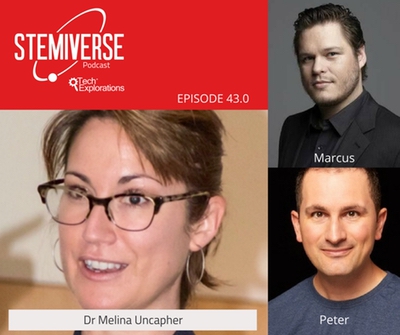[spp-player]

In this episode, Dr. Peter Dalmaris talks with Dr. Melina Uncapher.
Dr. Uncapher is an Assistant Professor in the Dept. of Neurology at UC San Francisco, and Director of Education for Neuroscape. Neuroscape is a translational neuroscience center that bridges the gap between neuroscience and technology. Melina has spent 16 years at the forefront of learning neuroscience and now applies research to solve real-world problems in education and technology.
Melina leads a multi-university National Science Foundation-funded network studying how executive function contributes to academic achievement and is leading an initiative to launch Learning Engineering as a new way to build research-practice partnerships. She co-founded and is CEO of a nonprofit that arms educators and students with practical tools based on learning science: The Institute for Applied Neuroscience. Melina runs an NIH-funded research program that investigates whether technology use is associated with neurocognitive changes.
She co-chaired a 2015 National Academy of Sciences conference on children and technology and sits on the board of the Institute of Digital Media and Child Development. She is also affiliated with Stanford’s Psychology Department and is a MacArthur Scholar. Her work has been highlighted in media outlets such as the New York Times, PBS, and Frontline. Her science outreach work includes serving as Script Supervisor on the Emmy-nominated PBS TV series ‘The Brain with David Eagleman’ and as scientific advisor on an award-winning short film about the brain.
This is Stemiverse Podcast episode 43.
Stemiverse podcast is brought to you by Tech Explorations, a leading provider of educational resources for Makers, STEM students, and teachers. Go to techexplorations.com to see a complete list of our books and courses covering the Arduino, Raspberry Pi, and electronics.
Show Notes
- [spp-timestamp time=”00:00″] Introduction – Introducing Dr. Melina Uncapher
- [spp-timestamp time=”03:49″] Melina talks about her background and what brought her to Neuroscience Research
- [spp-timestamp time=”12:27″] Learning modes
- [spp-timestamp time=”14:03″] Talking with teachers at the systems level about how the brain works and learns
- [spp-timestamp time=”15:12″] What is Educational Neuroscience – Examples of findings that have changed the work a practitioner would do in the classroom – Misconceptions
- [spp-timestamp time=”19:30″] Institute for Applied Neuroscience: A bridge between practitioners and researchers
- [spp-timestamp time=”22:19″] Building a new field: Learning Engineering – Bror Saxberg
- [spp-timestamp time=”24:07″] Unlocking the science of learning
- [spp-timestamp time=”26:51″] What would a breakthrough in the science of learning look like in the next 5-10 years?
- [spp-timestamp time=”28:40″] Individualized instruction
- [spp-timestamp time=”29:09″] The role of the hippocampus in learning and memory
- [spp-timestamp time=”33:52″] Dr. Zagami’s EEG headsets – Studying the brain
- [spp-timestamp time=”35:36″] Social Encoding
- [spp-timestamp time=”36:20″] Arming teachers with the best possible information and understanding about how the brain works. How can we help them recognize how much they already know through their practice?
- [spp-timestamp time=”38:12″] Coining the term “Learning Architect.”
- [spp-timestamp time=”39:57″] The impact of a good teacher on students
- [spp-timestamp time=”40:53″] The misconception that the first three years of living are the most important for brain development
- [spp-timestamp time=”43:26″] Brain plasticity after puberty and life-long learning
- [spp-timestamp time=”44:43″] Understanding why we sleep: Consolidation
- [spp-timestamp time=”48:02″] The consequences of multitasking on learning and tips on how to reduce the damage
- [spp-timestamp time=”53:08″] Reinforcing the signal by receiving the information from multiple media: Dual-coding theory and task switching
- [spp-timestamp time=”57:10″] Using analogies as a teaching tool
- [spp-timestamp time=”57:27″] Book Recommendations by Melina:
- The ABCs of How We Learn: 26 Scientifically Proven Approaches, How They Work, and When to Use Them by Daniel L. Schwartz, Kristen P. Blair, Jessica M. Tsang
- Make It Stick: The Science of Successful Learning by Peter C. Brown, Henry L. Roediger III, Mark A. McDaniel
- Social: Why Our Brains Are Wired to Connect by Matthew D. Lieberman
- Age of Opportunity: Lessons from the New Science of Adolescence by Laurence Steinberg
- [spp-timestamp time=”59:29″] Applications Melina can’t live without: Evernote
- [spp-timestamp time=”01:00:22″] Taking notes with a pen vs. digitally
- [spp-timestamp time=”01:03:25″] Melina’s Contact Information: Websites: Neuroscape and Brain science for good Twitter: @neuromelina

